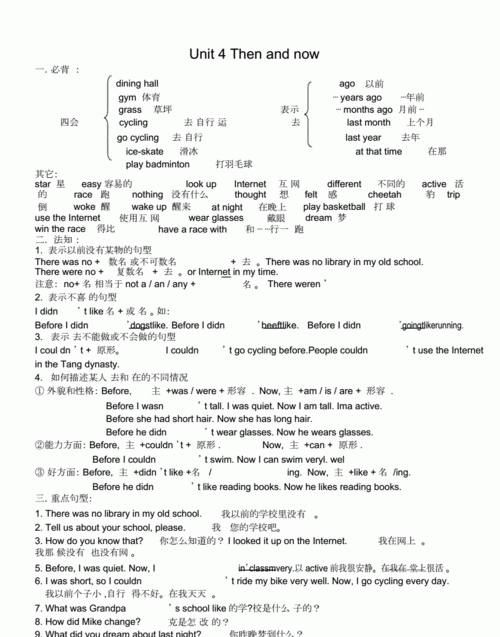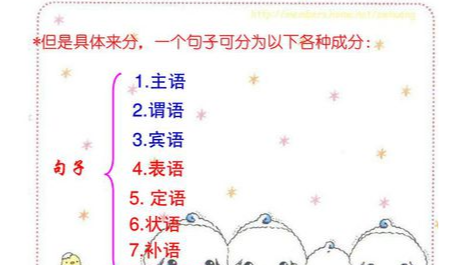本文目录
六年级下册英语必考知识点人教版
六年级英语必考知识点:
1.They are afraid of him.
此句中be afraid of意为“害怕某人”。例如:I am afraid of my maths teacher.我害怕我的数学老师。
2.The cat is angry with them.
此句中be angry with意为“对某人生气”。例如:I broken the cup. My mother is angry with me.我打碎了杯子。妈妈对我很生气。
3.What’s wrong?
此句用于询问对方有什么问题或有什么不顺心的事情,意为:怎么啦?出什么事了?
例如:A: What’s wrong, Jim?吉姆,你怎么啦?
B: Maybe I am ill.也许我病了。

4.He should see a doctor this morning建议某人应该做某事的句型。
此句中should为情态动词,表示“应该,应当”。此句用来给别人提建议。例如:
He should work harder.他应该更加努力。
You should help your mother with the housework.你应该帮你母亲做家务。
5. What are you doing?
此句是现在进行时态的特殊疑问句,其基本结构为:疑问词+be+主语+其他?例如:
What is he doing now?回答:He is swimming.
肯定句结构为:主语+be+动词-ing形式+其他.例如:We are running now.
六年级上册英语必考知识点冀教版
一、词汇。
traffic tools(交通工具):bike自行车,bus公共汽车,train火车,plane飞机,ship轮船,taxi出租车,ferry轮渡,sled雪橇,subway地铁(乘坐某种交通工具用by,但步行要用on foot)。
by乘坐,slow down慢下来,foot脚,stop停下来,how怎样,go to school上学,far远的,usually通常,sometimes有时候,traffic lights交通灯,traffic rules交通规则,stop停止,wait等待,mean意思是,driver司机,right右边,left左边,must必须,know知道,over there那边。

二、重点句型。
1、询问交通方式用疑问代词how。
(1)--How do you go/come to school?你怎样去/来上学?--I go/come to school on foot.我走路去/来上学。
(2)--How does your father go to work?你父亲怎样去上班?--He goes to work by subway.他坐地铁去上班。
2、询问地点用疑问代词where。
--Where is the nature park?自然公园在哪里?--It’s near the post office.在邮局旁边。
--Where are the teachers?老师们在哪里?--They are in the teacher’s office.他们在办公室里。
3、问路。
-- How can I get to the Fuxing hospital?我怎么去福星医院?--Take the No.57 bus over there.在那边乘坐57路公交车。
4、交通规则。
Slow down and stop at a yellow light. Stop and wait at a red light. Go at a green light. Don’t go at a red light.别闯红灯。
In China ,people drive on the right side.在中国,人们靠右行驶。In the UK,people drive on the left side.在英国,人们靠左行驶。
5、频度副词是表示做的次数多少的词语。从多到少依次排列为:always总是,usually通常,often经常,sometimes有时候,never从不。频度副词可以放在句首,也可以放在人称的后面。例如:Usually I go to school by bus.=I usually go toschool by bus。
6、I must pay attention to the traffic lights.交通灯traffic lights,交通规则traffic rules .这两个词后面都一定要加s,绝对不能少。因为交通灯有红黄绿三盏,一定是复数,交通规则不肯呢过只有一条,所以都一定要加s。
7、on foot=walk,都是走路的意思,但是用法不同,on foot用在句子末尾,而walk的用法与go相同,可以替代go的位置,例如:walk home走路回家,walk to school走路去上学,walk to work走路去上班,walk to hospital走路去医院。
8、In the USA people on bikes must wear a helmet在美国骑自行车的人必须戴头盔。国家名缩写前面要加the,缩写字母都要大写。如the USA美国the UK英国。
7年级上册英语知识点总结详细
您好 知识点如下:
1. 现在进行时
表示正在发生的事情或进行的动作,常与now,listen,look等词连用,结构是主语+be动词(am, is, are)+动词ing.
如:It is raining now.
外面正在下雨
It is six o’clock now.
现在6点了
My parents are reading newspapers in the sitting room.
我父母正在客厅看报纸
Look! The children are having a running race now.
看!孩子们正在赛跑
问句将be动词移前,否定句在be动词后+not.
2. 一般现在时
表示经常反复发生的事情或动作,常与often, usually, sometimes, always, every day(week year…) on Sundays等词连用。
结构是主语+动词原形;当主语为第三人称单数即he,she, it, Tom, my mother, the boy等词时,动词后加s或es.
如:We have an English lesson every day.
我们每天都要上英语课
Do the boys run faster than the girls? Yes, they do.
男孩比女孩跑的快吗?是的
问句借助于do, does否定句借助于don’t, doesn’t,后面动词一定要还原。
3. 一般过去时
表示发生在过去的事情或存在的状态,常与just now; a moment ago; … ago; yesterday; last ( week; month; year; Monday; weekend); this morning等词连用。
结构是主语+be动词的过去式(was; were)或主语+动词的过去式。
注意:be动词与动词过去式不可同时使用。
如:My earphones were on the ground just now.
我的耳机刚刚还在呢。
Where were you last week? I was at a camp.
你上个星期去哪了?我去野营了
What did you do yesterday? I visited a farm
你昨天去干嘛了?我去参观农场了。
问句有be动词将be动词移前,没有be动词借助于did,后面动词还原;
否定句有be动词在后面加not,没有借助于didn't后面动词还原。
4. 一般将来时
表示将要打算发生的事情或动作,常与tomorrow, next week(year; Tuesday…), this week( weekend ;evening; afternoon;…)today等词连用。结构是主语+be(am, is, are) going to + 动原或主语+will +动原。
如:What are you going to do tomorrow? I am going to have a picnic.
你明天要去干嘛?我要去野餐。
The childre are going to have a sports meeting next week.
孩子们下个星期将参加运动会。
Tom will/is going to see a play with his father this evening.
Tom今晚将和父母去看演出。
问句将be动词或will移前;否定句在be动词或will后加not.
5. 情态动词
can; can’t; should; shouldn’t; must; may后一定加动词原形。
如:The girl can’t swim, but she can skate.
女孩不会游泳,但是会滑冰
Don’t talk in class, you should listen to the teacher carefully.
不要再课上说话,你应该认真听老师讲。
6. 祈使句
肯定祈使句以动词原形开头;否定祈使句以don’t加动词原形开头。
如:Open the box for me ,please.
请为我打开盒子。
Liu Tao! Please get up earlier tomorrow.
刘涛,明天请早点起床!
Don’t walk on the grass!
不要在草地上走!
Helen! Don’t climb the tree,please.
海伦!不要爬树。
7. go的用法
去干嘛用go +动词ing
如: go swimming; go fishing;
go skating;
go camping;
go running;
go skiing;
go rowing…
8. 比较
than 前用比较级;as…as之间用原级。
如:My mother is two years younger than my father.
我妈比我爸年轻两岁。
Liu Tao jumps as far as Ben.
刘涛跳得和本一样远。
9. 喜欢做某事
用like +动词ing或like+ to + 动原。
如: Su Yang likes growing flowers.
苏阳喜欢种花。
The children like to play with lanterns at Spring Festival.
孩子们喜欢在春节去玩花灯。
10. 想要做某事
用 would like +to+动原或want + to +动原。
例:I’d like to visit the History Museum.=I want to visit the History Museum
11. some
用于肯定句中,在否定句和问句中改为any,但当表示委婉语气时仍用
如:Can I have some writing paper? Would you like some orange juice?
12. 代词
人称代词主格做主语用一般放在句首或动词前,主格分别是 I you he she it we you they。
宾格做宾语用,一般放在动词或介词后
如:Open them for me. Let us …, join me等。
宾格分别是me you him her it us you them。
形容词性物主代词放在名词前,不能单独使用,分别是my your his her its our your their
名词性物主代词相当于形物加名词,它只能单独使用后面不好加名词,分别是mine yours his hers its ours yours theirs。
13. 介词
介词后要么不加动词,加动词只能加动词ing形式
如:be good at running;
do well in jumping;
14. 时间介词
季节前,月份前用介词in
如:in summer;in March
具体的哪一天如星期几,几月几日用介词on
如:on Saturday; on the second of April; on Wednesday morning
在几点钟前用介词at
如: at a quarter to four;
只在上下午晚上用in
如:in the morning/ afternoon/ evening;
但在夜间用at night。
另:季节,月份和星期前不好加the.
15. 名词复数构成的方法
有规则的有:
(1)直接在名词后加s
如orange—oranges; photo—photos;
(2) 以x, s, sh, ch 结尾的加es
如:box—boxes; glass—glasses; waitress—waitresses; watch—watches;peach--peaches
(3) 以辅音字母加y结尾的改y为i加es
如:study—studies;library—libraries; hobby—hobbies; family—families;
(4)以f, fe结尾的改f, fe 为v+es如:knife—knives; thief—thieves(注:以o结尾的我们学过的只有mango加es, mango—mangoes其余加s,)
不规则的有:
man—men; woman—women; people—people; child—children
16. 动词第三人称单数的构成
(1)直接在动词后加s
如:run—runs; dance—dances
(2)以s,sh,ch,o结尾的加es
如:do—does;go—goes;wash—washes;catch—catches
(3)以辅音字母加y结尾的改y为i加es
如:study—studies; carry—carries;
17. 现在分词的构成
(1)直接在动词后加ing
如:sing—singing; ski—skiing;
(2)双写词尾加ing
如:swim—swimming; jog—jogging;run—running;
(3)以不发音的e结尾的去e加ing
如:ride—riding; dance—dancing; make—making;
18. 规则动词过去式的构成
(1)直接在动词后加ed
如:clean—cleaned; milk—milked; play—played;
(2)以e结尾的直接加d
如:dance—danced; taste—tasted;
(3) 以辅音字母加y结尾的改y为i加ed
如:study—studied;carry—carried;
(4)双写词尾加ed
如:stop—stopped; jog—jogged;
不规则的有:am,is—was; are—were; do,does—did; have,has—had; go—went; meet—met; sit—sat; see—saw; get—got; tell—told; run—ran; come—came; steal—stole; read—read;
19. 形容词副词比较级的构成
规则的:
(1)直接在形容词或副词后加er
如;small—smaller; low—lower;
(2)以e结尾的加r
如:late—larer;
(3)双写词尾加er
如:big—bigger; thin—thinner; fat—fatter;
(4) 以辅音字母加y结尾的改y为i加er
如:heavy—heavier; early—earlier;
不规则的有:
good, well—better(最高级为best); many, much--- more(最高级为most); far---farther;
20. rain与snow的用法
(1)作为名词意思是雨水和雪是不可数名词
如:There is a lot of rain there in spring. 那儿的春天有很多雨水。
(2) 作为动词意思是下雨和下雪,有四种形式分别是:
动词原形rain, snow;
第三人称单数rains ,snows;
现在分词raining; snowing
过去式rained; snowed;
如:①Look! It is raining now. 瞧!天正在下雨。
②It often rains in Nantong in summer.南通夏天经常下雨。
③ It rained yesterday.昨天下了雨。
④It is going to rain tomorrow. 明天要下雨。
(3)形容词为rainy 和snowy 意思是有雨的和有雪的
如:It is often rainy here in spring.这儿的春天经常是有雨的。
If it is rainy tomorrow, I’ll stay at home.如果明天是有雨的,我将呆在家里。
21. 比较级
注意只有同类事物才可进行比较。
如:My eyes are bigger than hers.Your school bag is heavier than mine. My computer is nicer than Nancy’s. My brother is stronger than me.
22. have, has
表示某人有(has用于第三人称单数);There is/ are;
There was/ were 表示某地存在有
注意There be 句型的就近原则
单数或不可数用there is /was;
复数用there are/ were.
23. 本身就是复数的词
眼镜glasses; 耳机earphones; 鞋shoes;裤子trousers等词本身是复数。
如:My glasses were on the chair just now.
但如果表示这双,这副,一双的时候用单数
如:There is a pair of chopsticks on the plate. This pair of earphones is for you.
24. 五个元音字母分别是Aa, Ee, Ii, Oo, Uu;
25. 一个的用法
a用于辅音前不是辅音字母前;an 用于元音前不是元音字母前。
如:There is an ’s’, a ‘t’, a ‘u’, a ‘d’ ,an ‘e’, an ‘n’,and a ‘t’ in the word ‘student’.
26. 时间表示法
有两种:
(1)直接读时钟和分钟。
如6:10读成 six ten; 7:30读成seven thirty; 8:45读成eight forty-five;
(2)用to与past表示。
在半小时包括半小时以内用几分past几点
如:6:10读成ten past six; 7:30读成half past seven;
过了半小时用下一个钟点差几分
如7:45读成a quarter to eight; 9:50读成ten to ten;
27. 基数词变序数词的方法
基变序有规律,结尾加上th; 一二三特殊例,结尾字母t、d(即first, second, third);
八去t, 九去e, ve要用f替(即eigh—eighth; nine—ninth; five-- fifth ;twelve—twelfth);
ty改y为ie后加th别忘记(即整十数如twenty—twentieth;forty—fortieth);
几十几十位为基个位为序(如第二十一为twenty-first)。
另外强调序数词前一定要加the。
28. 日期的表示法
用the+序数词+ of +月
如:三月三日 the third of March;
12月25日 the 25th of December.
29. both 表示两者都
如:My parents are both teachers.
all表示三者以上都
如:The students are all very excited.
30. 节日的表示法
有day的节日前用on.
没有day的节日前用at,
如:at Christmas; on Christmas Day; at New Year; on New Year’s Day.
31. 激动兴奋的
excited表示激动的,兴奋地主语是人;
exciting表示令人激动的,令人兴奋的主语是事情
如:The running race is very exciting, so all the students are very excited.
赛跑非常令人激动,因此所有的学生都很激动。
32. 比较
两者比较用比较级,三者以上比较用最高级
如:Who runs faster, the boy or the girl? The boy does
谁跑得更快,男孩还是女孩?男孩。
Which season do you like best? I like autumn best.
你最喜欢哪个季节?我最喜欢秋天。
Which season do you like better, summer or winter? I like winter better.
你更喜欢哪个季节,夏天还是冬天?我更喜欢冬天。
33. 动词还原的用法
前面用了do, does did, don’t, doesn’t didn’t后面动词要还原。
如:Did she watch TV last night?
Helen doesn’t like taking photos.
34. 到了
到达用get to
但注意到家,到这儿,到那儿不可以加to
如:get home; get here; get there,
另外go home; come here; go there也一样。
35. 长着和穿着
长着什么用with
如:the girl with big eyes 大眼睛的女孩;
穿着什么用in
如:the man in black穿黑衣服的男人
或:the woman in the white skirt 穿白色短裙的妇女
36. 让某人做某事
用let sb后加动词原形
如:Let’s water the flowers together.
是该做…的时候了用It’s time for+名词或It’s time to +动原。
帮助某人做某事是help sb with sth
如:帮我学英语是 help me with my English
37. 树上
外来的东西在树上用in the tree
如:the bird in the tree;
树上长的用on the tree
如:the apples on the tree
38. 运动和乐器
球类之前不加the;
乐器之前必须加the
如:play the piano; play football
39. 一周中的第一天是Sunday; 一年中的第一个月是January
40. get后加比较级表示变得更怎么样 。如:get stronger; get longer
望采纳 谢谢

六年级英语语法知识点归纳
六年级英语语法知识点有如下:
1、主谓结构:I run 谓语一般是不及物动词,后面不加宾语。
2、主谓宾结构:I play basketball这里的谓语是及物动词后面加宾语。
3、主谓加双宾:I give you a book这里的you.book都是宾语。
4、主谓宾加宾补:I found the book interesting 这里的interesting是宾补。

主语为谓语动作的使动方。
主谓宾=主语+实义动词+宾语,be是系动词,不能用于主谓宾中。主系表=主语+系动词(最常见的是be,还有“五感”feel、look、sound、smell、taste和其它动词如become、grow等)+表语(名词、代词、形容词、时间地点副词、介词短语、表语从句等)。
I am a boy.这句话中没有宾语,属于主系表,I是主语,系动词am是谓语动词,a boy是表语,系动词和表语合起来作谓语。由此可见在主系表中,谓语≠谓语动词;而在主谓宾中,谓语=谓语动词,如I love you。总之,系动词和宾语是不共戴天的仇人,誓不两立。系动词后面接的是表语,而宾语前面接的是谓语。
以上就是关于六年级英语需要掌握的知识点 ,六年级下册英语必考知识点人教版的全部内容,以及六年级英语需要掌握的知识点 的相关内容,希望能够帮到您。
